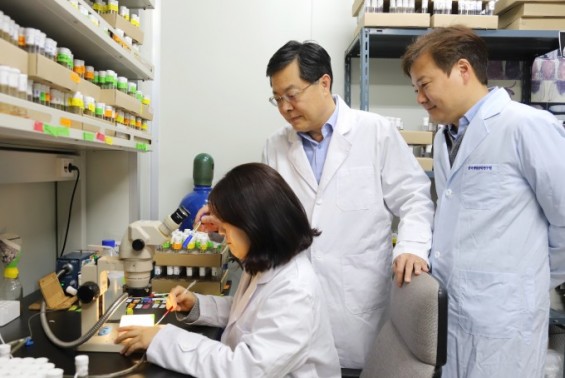
Yoo Kwon Life-Yeon Senior Researcher (center) is concentrating on research in the laboratory. Provide life-related.
Researchers in Korea have identified the causes of eating disorders that cancer patients experience. It is expected that the side effects of chemotherapy can be improved by improving the eating disorders of cancer patients.
The research team at the Korea Research Institute of Bioscience and Biotechnology Yu Kyu-sun Lee, Director of the Bio-Nano Research Center, Professor Jae-myung Seo and Professor Song-cheol Kim of Asan Medical Center, Seoul Asan Medical Center. It revealed on the 18th that it discovered a principle that regulates hormones. The research results were published in the online edition of’Nature Cell Biology’ on February 9.
Cancer cachexia syndrome, a typical complication of cancer patients, is accompanied by severe eating disorders and persistent weight loss. Although it is known to have a negative effect on cancer patient survival and chemotherapy, the cause of eating disorders in cancer patients has not been identified.
The research team confirmed that the expression and secretion of a specific protein (Dilp8 peptide) derived from cancer cells was significantly increased by analyzing the Drosophila cancer model and RNA transcriptome. It was found that certain proteins induce eating disorders in the Drosophila model by altering the expression of neuropeptide hormones involved in appetite regulation through cranial nerve cell receptors.
Based on these findings, the research team of Professor Jae-myung Seo of KAIST Graduate School of Medical Science confirmed that even in the mouse model that caused cancer,’INSL3′, a homologous factor with a specific protein, was significantly increased, causing eating disorders. In particular, when INSL3, a protein secreted by cancer cells, was injected directly into the mouse brain, food intake and weight were reduced.
A research team at Seoul Asan Medical Center conducted a clinical relevance study in pancreatic cancer patients with the highest incidence of cancer cachexia syndrome. As a result, the concentration of INSL3 was high in pancreatic cancer patients with eating disorders.
The protein secreted from cancer cells (INSL3) acts on the nerve cells involved in the regulation of appetite in the cranial nervous system, reducing the appetite of cancer patients. We found that INSL3 protein is an important signaling factor in causing eating disorders in cancer patients.
“The basic and original research results found in the Drosophila experimental model were confirmed in rats and reconfirmed in the clinical studies of cancer patients,” said Yoo Kwon Life-Researcher. If the strategy is developed, it can be used not only as an adjuvant for chemotherapy for cancer patients, but also for the development of metabolic diseases for the general population.”
